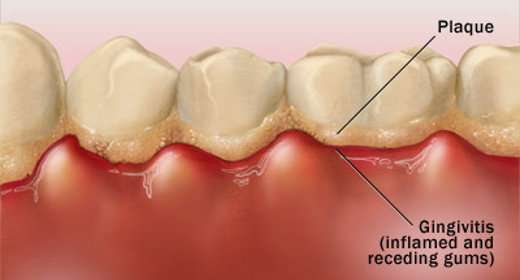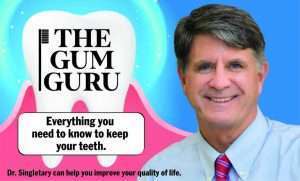
When explaining to patients their likelihood of developing inflammatory gum disease, I describe what I call the “Pyramid of Susceptibility.” This pyramid is comprised of three layers: (1) bacteria, (2) genetic makeup of saliva, and (3) immune system. These three components are significant determinants in a person’s likelihood to develop gum disease. Furthermore, consideration of these factors, along with a number of external variables, can help predict and prevent the development of periodontal disease for each individual patient.
At the top of the pyramid is the cause of gum disease— bacteria. Colonies of bacteria, called plaque, begin to grow after 24 hours if not removed by brushing or other means. The buildup of bacteria then instigates an inflammatory response in the body to combat the hostile bacteria. Bacteria growth itself is not an inheritable variable. In other words, one’s genetics do not play a role in determining how many oral bacteria will accumulate.
However, some people are more susceptible to bacterial growth than others. Therefore, the key to toppling the pyramid is the choices individuals make to slow the growth of bacteria, or not. Such choices include whether one follows a regular oral hygiene regimen, chooses sugary foods, etc. These choices can determine the number of bacteria that can build up. The physical removal of plaque, the sticky film in which bacteria thrive, is the most important part of preventing gum disease. But if plaque is allowed to populate for more than 24 hours, the second and third layers of the pyramid, which are largely determined by one’s genetics, come into play.
The second layer of the pyramid of susceptibility is comprised of the makeup of saliva—the fertilizer for bacteria. The genetic makeup of one’s saliva depends upon unique inherited factors. The mucoproteins in the saliva, which is also an inheritable factor, determines what type of bacteria grows in the mouth. Some bacteria are more pathogenic than others, so if the mucoproteins that one possesses are more conducive to the growth of bacteria, then that person’s body is more susceptible to bacteria and thus, is more prone to periodontal problems.
The body’s immune system response is the third layer of the pyramid, and it too is an inherited factor. There are two ends of the spectrum to immune responses—hyper response or complete lack of response. If your body’s reaction is a hyper response, i.e. lots of inflammation, bleeding, and swelling, it is your body responding to the bacteria. However, if your body does not respond at all, i.e. you experience no inflammation, bleeding, or swelling, this may be a sign that your oral bacteria is producing a toxin that both destroys the gum tissue and stops the body from responding. In other words, this toxin handcuffs the immune system and prevents the body from raising a defense to the bacterial destruction of gum tissue and bone.
Despite an individual’s heightened susceptibility to gum disease due to the two inherited components of the pyramid—the makeup of saliva and immune response—one may still avoid periodontal problems by toppling the top layer of the pyramid and the cause of gum disease, bacteria. This can be achieved by the physical removal of bacteria before 24 hours have elapsed, as previously discussed. The removal of bacteria from all 5 surfaces from each tooth at least once a day will keep the bad guys at bay.
Furthermore, one can mitigate a detrimental immune response by not only removing oral bacteria but also by taking an antibiotic, if need be. Finally, if the immune response to bacteria is non-existent, try to eliminate stress, smoking, anti-inflammatories, and other factors that may attenuate a response. Also, it is a good idea to eat foods that promote healing, particularly leafy greens and foods rich in citric acid. Finally, consider supplementing with a vitamin that promotes bone tissue repair.
We are always here for you. Please don’t hesitate to call us at (919) 518-8222 if you have any questions or would like to schedule an appointment.
 For more information on this topic, listen to the Gum Guru Podcast by clicking the link below:
You’ve Been Diagnosed With Gum Disease
A Simple Way To Decrease Your Risk Of Dementia
For more information on this topic, listen to the Gum Guru Podcast by clicking the link below:
You’ve Been Diagnosed With Gum Disease
A Simple Way To Decrease Your Risk Of Dementia
